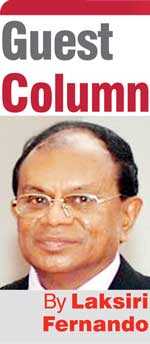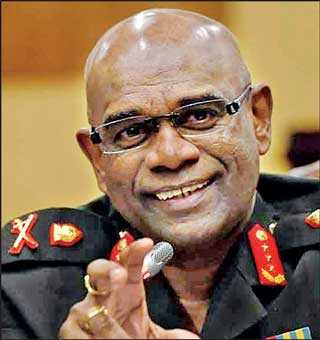Sunday Feb 15, 2026
Sunday Feb 15, 2026
Friday, 4 October 2019 00:00 - - {{hitsCtrl.values.hits}}
“Metaphorically, while guns have bullets, they also have trigger locks, which make guns, and by analogy, militaries, subdued in time of peace. In a similarly symbolic way, a rose may represent a burgeoning civil society and at the same time become a thorn to state authority and military” – S. Ratuva et al. (‘Guns and Roses: Comparative Civil-Military Relations in the Changing Security Environment,’ Palgrave, 2019)
The context
These are undoubtedly difficult and confusing times for all Sri Lankans. A major background reason is the Easter Sunday terrorist attacks, on top of the betrayal and unfulfillment of the main aspirations of the people by the incumbent Yahapalana Government. People trusted the Government, but the  Government betrayed the people. The main responsibility goes lies with both the President and the Prime Minister, and also with the UNP/UNF and the SLFP political parties in general.
Government betrayed the people. The main responsibility goes lies with both the President and the Prime Minister, and also with the UNP/UNF and the SLFP political parties in general.
At least within the UNP/UNF, there is a partial leadership change. But the question remains, why was this change delayed until the last moment? If a rectification of policies, if not a leadership change, took place much earlier, the people could have trusted the new leaders more. The slogan ‘Sri Lanka First’ should have come before, both in economic and foreign policy matters. ‘People First’ should be much better, not only as a slogan, but as a firm policy.
Of course a change has occurred within the SLFP constituency as well, through a virtual breakaway, but for all wrong reasons, leading to the formation of the SLPP. The primary objective appears to be to negate the 2015 change, completely whitewash Rajapaksa misdeeds, and bring back family rule in a more explicit manner.
Role of civil society
Many civil society organisations played a decisive role in producing the governmental change in 2015, which was necessary and positive. A major mistake on their part, however, was their failure to mobilise the people in a constructive manner to make the popularly installed UNF Government more accountable, to their promises and obligatory duties.
Instead, many of the leaders of these civil society organisations got embroiled in internal fights within the regime, taking one side or the other. They neglected their role as pressure groups and civil society organisations.
The same criticism goes largely for the two minor political parties, the TNA and the JVP that also facilitated the 2015 change. The other minor parties of course directly participated in the Government misdeeds. As minor parties, both the TNA and the JVP do represent the civil society to a large extent, apart from their own aspirations or political objectives.
 |
Major General Mahesh Senanayake |
At the forthcoming Presidential Election, there are two main dilemmas for the civil society organisations. Firstly, because of the mistakes, negligence or betrayals of the incumbent government, the civil society organisations cannot comfortably support the UNF candidate, although there are some policy changes announced. Secondly, just because of the weaknesses or the betrayals of the incumbent Government, the civil society organisations cannot at all become party to negate the 2015 change, and facilitate a return of the family rule.
It is because of the above situation that several or many civil society organisations have opted for a Third Alternative which is healthy and necessary. That is to put forward their own candidate or candidates with radically different platforms to the status quo parties. Given the existence of the second preference, this alternative would not allow family rule to come back, nevertheless cautioning the incumbent Government’s candidate, for their collective mistakes.
NPP and NPM
In this direction, two main formations have emerged as the National People’s Power (NPP) and the National People’s Movement (NPM). There is a possibility of another civil society organisation, Vinivida (transparency) Foundation, backing Nagananda Kodituwakku, fielding his candidacy. Although the NPP cannot be considered completely a civil society organisation, since the JVP is leading, there are many civil society organisations and groups supporting and backing that effort.
It is reported that Anura Kumara Dissanayake also was willing to give the candidacy to someone else, but many partners apparently have selected him. He is contesting as an independent candidate. It is also well known that even in 1982, the JVP was initially wanted to put forward Dr. A.T. Ariyaratne as a common civil society presidential candidate. The JVP’s association with civil society organisations and professional associations is also longstanding, although the JVP has a tainted history of two violent insurrections.
The NPM is a movement formally launched in December 2018, aftermath of the October-December constitutional crisis, on the initiative of Deshodaya and the United Professionals Movement (UPM). There were 17 other organisations participating. Deshodaya is a widespread social initiative launched in 2001 by Sarvodaya movement with some broad socio-political objectives. Sarvodaya website describes the objectives as follows.
“Deshodaya means ‘awakening the nation’ and this unit was established to promote a culture of democracy, good governance, reconciliation, and sustainable peace. Participation of ordinary citizens on the board and principles of consensual politics are employed to strengthen the people’s sovereignty.”
The UPM has a similar history formed by many professionals (engineers, academics, doctors and lawyers) and the following is what it said aftermath of the constitutional crisis in October 2018.
“The UPM firmly stands for law and order, justice, good governance based on democratic principles upholding the supreme will of the people of Sri Lanka. The UPM believes that professionals and patriots should rally together as ‘one’ to denounce this ridiculous charade of the current politicians and unite to professionally craft a new developed Sri Lanka.”
Selection of the candidate?
There appear to be two major recent reasons for the NPM to put forward a presidential candidate. (1) The October constitutional crisis where all parties and political leaders became suspect and unreliable. (2) The Easter terrorist attacks that exposed the failure of political leaders to safeguard national security. It may be the latter reason why they have now selected a military leader for the candidacy. This however contradicts what they stood for a long time in educating, empowering and mobilising the ordinary citizens to change the political leadership, political culture and the establishment through (non-military) civil society and people’s initiatives.
There are considerable differences between what we mean by the civil society, the political establishment and the military. These are three layers of the socio-political structure, vertically hierarchical. Just because the civil society or civil society organisations are disillusioned with the political establishment, they should not opt for the military leadership or establishment, whatever the merits appear in the short run. There are so much of Latin American and African experiences that was going awry when the civil society organisations made the same mistake. Burma, Indonesia and Pakistan are also examples from Asia.
From the beginning of the NPM, I understand that there was an executive committee in decision making. Initially, Dr. Vinya Ariyaratne (Deshodaya), Gamini Nanda Gunawardana (UPM), Nagananda Kodituwakku (Vinivida Foundation) were the prominent members among others. However in recent months Gamini Wijeshinghe and Dr. Ajith Colonne had taken a more prominent role. They are undoubtedly capable persons. Ajith Colonne is also a person with a military intelligence background.
It appears that the organisation had adopted recently a ‘loose policy’ in selecting the ‘most influential’ candidate for the presidential race from friends and associates. While any of the above personalities were quite qualified to be the organisation’s candidate, this might be the reason why they finally opted to put forward the recently-retired Army Commander Mahesh Senanayake as their candidate.
The decision may have some merits in attracting votes, particularly from the soldiers and their families in addition to the NPM’s traditional support bases particularly from the movements like Deshodaya. There are those who, based on gut feelings, hail the decision as Mahesh Senanayake might erode some votes of Gotabaya Rajapaksa. However, that is short sighted thinking for a civil society organisation or a civil society movement. The NPM campaign has already taken a military flavour. This is like mixing guns with roses.
Candidate’s vision?
Mahesh Senanayake’s speech at the launch of his candidacy at the Sugathadasa Stadium (29 September) was a mixed bag, with both positives and negatives. He emphasised the need for Alternatives (Vikalpa), outlining the failures and defects of 71 years of political rule. Corruption and misrule were emphasised. The alternatives should be ‘non-partisan’ (nirpakshika) he said. He also should be commended for emphasising the need for national harmony (sanhidiyawa), irrespective of ethnic or religious differences. A major positive of the event was the Sinhala-Tamil bilingual announcements, and giving at least the summaries of the Sinhala speeches in Tamil. However, it was not clear whether he was talking about reconciliation or just harmony.
He began his speech emphasising security or insecurity of the country. ‘Save and Serve Sri Lanka’ was the main theme of the event. His speech was patriotic, if not nationalistic. He in fact said Sri Lanka is a ‘big country,’ the ocean territory seven times of the landmass. ‘We have all resources, but what is lacking is a proper management.’ The National Flag was all over the place in the audience, and this much of ‘flag demonstration’ had not even been there in Gotabaya gatherings.
He also emphasised ‘discipline’ while noting on mutual respect. He was in fact critical of the society as well, which is also true. ‘Although we don’t understand the importance of the country, the outsiders do, and that is why we are vulnerable,’ he said while emphasising an independent, sovereign and non-aligned policy. He also emphasised the need to change the outdated constitution. Changing the legal system and obsolete laws was another emphasis.
‘One country, one law’ was his slogan. He emphasised the need for collective and group initiatives, taking all expert-services for the nation building effort. The organisation’s leadership collectives will bring further policies in the forthcoming days before the election, he promised. ‘This is not a personal effort but a collective endeavour,’ he emphasised again and again.
He said he can talk on ‘national security’ for days, but emphasised two requirements. First is the maintenance of peace, unity and harmony among the people. This cannot be done by party politics. Party politics is the bane of this country. ‘It can be done only by an independent head (leader) of State,’ he said.
Second is the strength and cohesion of the security forces, including the police. This is there at present, but their duties cannot be performed properly, due to political and corrupt influences of the politicians. He said his endeavour is to change the situation.
Senanayake was naturally very proud and elated when he spoke about the security forces. But he never uttered a word about the ‘civil society,’ except referring to a ‘people’s movement’ in one or two instances. Apart from the security forces, his reference was for the professional groups and their expertise.